
6 minute read
There’s been a complaint ...
British winter is synonymous with sideways rain, muddy fields and non-existent grass. We humans may hate it, but the livestock across Dorset doesn’t really notice the inclement weather. For millennia, animals have lived on the picturesque pastures of our county all year round.
Unfortunately, for a lot of the public, winter farming in the UK doesn’t match the glossy Countryfile version of farming they like. Because of this, bodies such as the RSPCA, the APHA (Animal Plant Health Agency) and Trading Standards get a seasonal influx of complaints. ‘Things just don’t look very good when it’s constantly raining and the the fields are muddy,’ says Neil Neil, manager of the Animal Health and Welfare team for Dorset Council Trading Standards. ‘Most calls that we get from members of the public are well meaning, but entirely unfounded – the welfare of the animals is fine. It just doesn’t look particularly pretty.’ With the high volume of complaints Neil and his team can receive, they have to trust their judgement with a lot of the local farmers.
‘We do probably visit the vast majority of them, but it’s a kind of risk assessment basis. If we know the farmer and we’ve been going there for a long time, we can deal with it via a phone call initially, just to see if there is a problem? Are they aware of it? Quite often that can resolve it.
‘To give you one example, we had a complaint about sheep in a field where a number of them were lame. It was a good sheep farmer that we’ve known for many years and we don’t
Well cared-for livestock is able to withstand an average British winter have any welfare concerns with the farm, so rather than waste limited resources going out for a visit, we phoned him and he freely admitted, “Yes, I know that they are lame. I’m desperate to do something about it but at the moment the ground is too wet to get the handling system out there to get them in the crush to sort the feet out.”
Mistakes have ben made Neil has been with Trading Standards for 30 years but isn’t from a farming background. He was moved ‘kicking and screaming’ into animal health because the previous manager wanted to go back to mainstream trading standards work.
‘While I haven’t got a farming background myself, the people who are in the team that actually go out and do the visits understand farming and farmers, who are very different from the usual business owners that I had was experienced in dealing with.
‘I freely admit I’ve made mistakes before – I’ve been out in the field with cows in the pouring rain. They looked bedraggled and miserable and thin. So I got a vet out to look at them with me the following day. Of course, by then it was bright and sunny, and the cows looked completely different!’
Neil has had to deal with a vast number of complaints about one farm in particular –
Maiden Castle Farm. The farm includes the Maiden Castle hill fort, and although it is owned by the Duchy of Cornwall, it is John Hoskins who is the tenant farmer with his wife and son.
‘We have Maiden Castle hill fort within the farm itself,’ John explains. ‘And with it we get some 50,000 visitors a year. As well as tourists, we get all the general public from Dorchester coming to walk their dogs. And we get all sorts of complaints at this time of the year.
‘We have cattle grazing behind an electric fence with stubble turnips and feeders with hay and straw in. But of course it’s wet and muddy, and all [the public] think is that the animals should all be living indoors.’
John is quick to make the point clear that even though their downland farm is open to the elements, their cattle are hardy and have managed to live outdoors for 5,000 years.

Oh no, it’s definitely dead
With the constant footfall over his land, John and his family have had to deal with complaints either to Trading Standards or direct to their face.
‘A year or two back we had a cow calving. We keep an eye on them all the time when they are calving and this lady stormed up to my wife and said “you’ve got a cow with its body all coming out”.
‘‘I suspect it’s calving,” my wife said. “Oh no, it’s definitely dead. There’s steam coming out”. When my wife got there, a calf was born, struggling to get up but alive and well. And my wife said: “Look, what you saw was the pre birth coming out”. But the woman would not have it.’ John is grateful to Neil Neil and the Trading Standards team who act as gatekeepers. He says: ‘They know where we are. And [Trading Standards] actually come out, not on a complaint, just to see what we have on stubble turnips, or what cattle we have grazing.
‘And if somebody rings them, say two days in a row, saying,
‘John has got a sheep with a bad foot’. If on the second day we haven’t done anything, Trading Standards will call me and say, “John can you go and see about that sheep? It’s on the Castle” and we respond.’
It’s a welltrodden path to talk about how farming is portrayed in the media.
Unfortunately, what the general public sees is either unrealistic ‘Countryfile farming’ or alarmist hidden camera footage on the news or social media showing the one per cent of farmers who mistreat their animals..
Neil has for the last six years been on the board of management for the Dorset County Show. He is a believer that educating the next generation is key.
‘The show has got a separate charity called Fabulous Food and Farming and its purpose is to promote agriculture. One way we do that is to invite school groups out to farms. We provide them with visits and we also provide funding for the transport to get them out there.
‘Good farmers are very keen to show off farming and the importance of what they’re doing. It’s difficult to get the public out and interested, but we can do that through things like the agricultural shows.’
The odd rogue Maiden Castle Farm hosts a local school throughout the year to try and help educate children. They have even converted a calf house into a classroom.

John Hoskins says: ‘We have a local school here once or twice a year just to show them what’s happening on the farm.
‘Everybody’s looking over our shoulder to see that we do things correctly and 99 per cent of farmers do that or more. But there’s always the odd rogue farmer that lets us down.’
There was a recent case of one of these ‘rogue’ farmers in the county, who ended up being prosecuted (Dorset farm fined £52,000 for causing unnecessary suffering- The BV, Nov 22) – and this is why Neil Neil doesn’t want to discourage the public from picking up the phone if they are worried about the welfare of any livestock they see.
‘It is incredibly rare that we have to go as far as court action. On a complaint visit, we always try and work with farmers to improve things. It’s a collaborative process that involves visiting, advising, giving an improvement notice if necessary and making sure that’s complied with.’
The local ‘rogue’ farmer in question had been having visits from Trading Standards for ten years and he was found to be doing the bare minimum. ‘We regard court action as the very last resort. We will always try to work with the farmer and their vets to make improvements. But ultimately, if things are ignored or things get to an unacceptable level, then we will be forced to take action.’
John Hoskins felt that the farmer in question was let off lightly.
‘It was disgusting. I can tell you, every farmer who knew about that wished he’d had a heavier sentence. Every single farmer you spoke to said he was a disgrace to our industry.’
But Neil has dealt with a lot of these cases of poor animal management and he understands that causing harm is rarely anyone’s intention. He says: ‘In most of these cases I would say there’s an element of the farmer having mental health issues that, in turn, result in their animals suffering. ‘We’re always mindful of that. And again, if we’re aware that the farmer’s struggling himself, we try and get him support through charities like the Farming Community Network.’ If you see an animal you believe to be in distress, please contact the correct authority. For agricultural animals such as pigs, cattle, sheep, goats and poultry contact Dorset Trading Standards. If you have concerns about the welfare of domestic animals such as cats and dogs please contact the RSPCA










